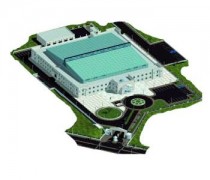This is a unique regional project that aims to bring scientists from the countries of the region to work together around a center where a light source (synchrotron) will be established at a high scientific level in Jordan. The project is based on the same principles that led to the construction of the European particle accelerator at CERN

This week (4.3.10) Deputy Foreign Minister Danny Ilon met with the President of the SESAME Council - Professor Llewellyn Smith and the Director of the Institute for Advanced Studies at the Hebrew University, Professor Eliezer Rabinowitz.
This is a unique regional project that aims to bring scientists from the countries of the region to work together around a center where a light source (synchrotron) will be established at a high scientific level in Jordan. The project is based on the same principles that led to the construction of the European particle accelerator at CERN in Geneva immediately after the end of World War II and which brought together French and German scientists and others to work together. The project was founded by a joint initiative of a number of scientists including Professor Rabinowitz and under the auspices of the UNESCO organization.
The member countries of the project are Bahrain, Egypt, Israel, Jordan, Pakistan, Palestine, Cyprus, Turkey, Iraq and Yemen.
The regional scientific project is currently in danger, despite all the resources invested in it due to a lack of funds. The purpose of the meeting was to present the political, scientific and budgetary commitment of the State of Israel. Deputy Minister Elon assured the President of the SESAME Council that Israel would be ready to contribute its share to the effort to complete the budget in the amount of approximately 5 million dollars in 5 years.

6 תגובות
Why not establish a synchrotron in Israel? This will take science a few steps forward. Working groups will be established in the fields of biology, nuclear energy, the structure of matter, and nanotechnology.
It won't happen with us. Do you know why?
1. It is more important to build a train to Eilat. So that in the next war we can all go to Eilat where they will extort the prices
And we can thus finance the thieving Knesset members.
2. Since Ben-Gurion, the ministers of finance and members of the Knesset have no vision for anything.
Such an accelerator will only benefit us. both security and technological. That way more scientists will have access to an accelerator (of any kind) - while it will be two meters from the house.
May the force be with us all.
I agree with Ofer.
There is no choice but to reach a state of regional peace at some point, and we must keep trying.
Just think how much good it could do for everyone!
Has anyone ever imagined what the country would look like if we didn't have to spend 40% of our budget on security? Or what life would be like if you could take the car and take a trip with the family not to the Golan - but to Spain?!
We have to keep trying. If we live with the attitude that nothing can change then nothing will change.
In my opinion, scientific collaborations are an important direction, this is a slow exposure of cultures, the intellectuals meet each other and talk, usually they are more open than non-educated people, so there is a higher chance of conversation. Once we stop trying and talking to them we will be just as bad as those who treat us like monkeys and are not willing to talk to us.
It is clear that the project will be closed, it is a shame for the efforts. The most advanced development of these countries is an atomic bomb designed to destroy people (Pakistan). The mentioned countries do not have a serious industry or an important technology developed in them.
With the exception of Cyprus, all of them are hostile to Israel and even anti-Semitic.
Cooperation in Europe is done by technologically advanced and industrial countries such as Germany and France.
A waste of time and a waste of money.
nothing came of it,
Just because Israel is also involved...